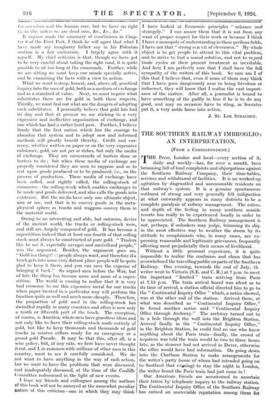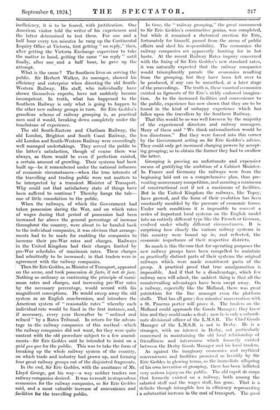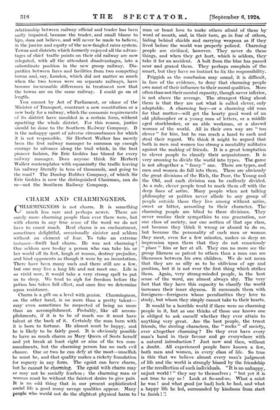THE SOUTHERN RAILWAY IMBROGLIO : AN INTERPRETATION.
(FROM A CORRESPONDENT.) THE Press, London and local—every section of it, daily and weekly—has, for over a month, been brimming full of loud complaints and objurgations against the Southern Railway Company, their time-tables, services and withdrawal of facilities. It is no worked-up agitation by disgruntled and unreasonable residents on that railway's system. It is a genuine spontaneous outburst of strong and very generally felt indignation at what outwardly appears in many districts to be a complete paralysis of railway management. The extent and depth of the feeling in many southern seaside resorts has really to be experienced locally in order to be appreciated. The Southern Railway management is not, perhaps, if onlookers may judge, trimming its ship in the most effective way to weather the storm by its attitude to complainants who, in many cases, are ex- pressing reasonable and legitimate grievances, frequently affecting most prejudicially their means of livelihood.
Without a little personal experience, it is quite impossible to realize the confusion and chaos that has overwhelmed the travelling public on parts of the Southern Railway. One evening, towards the end of July, th writer went to Victoria (S.E. and C. R.) at 7 p.m. to meet the important " limited " train arriving from Paris at 7.15 p.m. The train arrival board was silent as to its time of arrival, a station official directed him to go to the " Continental Inquiry Office " which, a notice showed, was at the other end of the station. Arrived there, at what was described as " Continental Inquiry Office," he found another notice said " Continental Inquiry Office through Archway." The archway turned out to be a hole through the wall into the Brighton Station. Arrived finally in the " Continental Inquiry Office," in the Brighton Station, he could find no one who knew anything about the Paris train—finally, the crowd of inquirers was told the train would be two to three hours late, as the steamer had not arrived in Dover, otherwise the office would have had information. On going down into the Chatham Station to make arrangements for the writer's party (some of whom had intended going on to Scotland that evening) to stay the night in London, the writer found the Paris train had just come in !
Our American friends are accustomed to ascertain their trains by telephonic inquiry to the railway station. The Continental Inquiry Office of the Southern Railway has earned an unenviable reputation among them for inefficiency, it is to be feared, with justification. One American visitor told the writer of his experiences and the latter determined to test them. For one and a half hour every ten minutes he rang up the Continental Inquiry Office at Victoria, first getting " no reply," then, after getting the Victoria Exchange supervisor to take the matter in hand, getting the same " no reply " until finally; after one and a half hour, he gave up the attempt.
What is the cause? The Southern lives on serving the Public. Sir Herbert Walker, its manager, showed his efficiency and enterprise when directing the old South- Western Railway. His staff, who individually have shown themselves experts, have not suddenly become incompetent. In truth, what has happened to the Southern Railway is only what is going to happen to the other new railway groups in turn. Sir Eric Geddes's grandiose scheme of railway grouping is, as practical men said it would, breaking down completely under the touchstone of experience.
The old South-Eastern and Chatham Railway, the old London, Brighton and South Coast Railway, the old London and South-Western Railway were exceedingly well managed undertakings. They served the public to the latter's satisfaction, though of course there was always, as there would be even if perfection existed, a certain amount of growling. Their systems had been built up—be it remembered under the national influence of economic circumstances—when the true interests of the travelling and trading public were not matters to be interpreted by a transient Minister of Transport. Why could not that satisfactory state of things have been suffered to continue ? Thereby hangs the tale— one of little consolation to the public.
When the railways, of which the Government had taken possession during the War, and on which rates of wages during that period of possession had been increased far above the general percentage of increase throughc?ut the country, were about to be handed back to the individual companies, it was obvious that arrange- ments had to be made for enabling the companies to increase their pre-War rates and charges. Railways in the United Kingdom had their charges limited by 'pre-War schedules of maximum rates. These charges had admittedly to be increased; in that traders were in agreement with the railway companies.
I Then Sir Eric Geddes, as Minister of Transport, appeared on the scene, and took possession de facto, if not de jure. Nothing so ordinary as continuing the principle of maxi- :mum rates and charges, and increasing pre-War rates by the necessary percentage, would accord with his magnificent conceptions. He would sweep away the old system as an English anachronism, and introduce the American system of " reasonable rates " whereby each individual rate would be fixed in the first instance, and, if necessary, every year thereafter be " unfixed and refixed " by a Rates Tribunal. In return for the advan- tage to the railway companies of this method—which the railway companies did not want, for they were quite content with the old procedure subject to a few amend- ments—Sir Eric Geddes said he intended to insist on a quid pro quo for the public. This was to take the form of breaking up the whole railway system of the country, on which trade and industry had grown up, and forming four great railway groups out of the disjointed fragments.
In the end, Sir Eric Geddes, with the assistance of Mr. Lloyd George, got his way—a way neither traders nor railway companies desired. It was to result in stupendous economies for the railway companies, so Sir Eric Geddes said, and a most valuable increase of convenience and ;facilities for the travelling public. In time, the " railway grouping," the great monument to Sir Eric Geddes's constructive genius, was completed, but while it remained a rhetorical erection Sir Eric, fortunately for himself, passed from the arena of public affairs and shed his responsibility. The economies the railway _companies are apparently hunting for in hot haste. At the recent Railway Rates inquiry concerned with the fixing of Sir Eric Geddes's new standard rates, it was naturally expected that the railway companies would triumphantly _parade the economies resulting from the grouping, but they have been left over to be produced, if any can be unearthed, at a later stage of the proceedings. The truth is, these vaunted economies existed as figments of Sir Eric's richly endowed imagina- tion. As to the increased facilities and convenience to the public, experience has now shown that they are to be found in the kind of unhappy experience which has fallen upon the travellers by the Southern Railway.
That this would be so was well foreseen by the majority of the experienced directors and railway managers. Many of them said " We think nationalization would be less disastrous." But they were forced into -this corner by the Government acting on Sir Eric Geddes's advice. They could only get increased charging powers by accept- ing grouping; so to obtain the former they had to swallow the latter.
Grouping is proving an unfortunate and expensive means of gratifying the ambition of -a Cabinet Minister. In France and Germany the railways were from the beginning laid out on a comprehensive plan, thus pre- venting unnecessary competition, and assuring a minimum of constructional cost if not a maximum of facilities. But in the United Kingdom the railways, like Topsy, have groomed, and the form of their evolution has been constantly moulded by the pressure of economic forces. Under such conditions it is impossible to convert a series of important local systems on the English model into an entirely different type like the French or German, evolved under wholly different circumstances. It is surprising how closely the various railway systems in this country were bound up in, and reflected, the economic importance of their respective districts.
So much is this the case that for operating purposes the new railway groups have been compelled to maintain as practically distinct parts of their systems the original railways which were made constituent parts of the group. A practical proof that true amalgamation is impossible. And if that be a disadvantage, which few railway men will admit, the saddest thing is that all the countervailing advantages have been swept away. On a railway, especially like the Midland, there was great patriotism for the line amongst even the platform staffs. That has all gone ; five minutes' conversation with a St. Pancras porter will prove it. The traders on the Midland could approach the Goods Manager; they knew him and they could make a deal ; now he is only a subordi- nate divisional officer of the L.M.S.R. The Chief Goods Manager of the L.M.S.R. is not in Derby. He is a stranger, with no interest in Derby, not particularly concerned in maintaining the old local relationship of friendliness and intercourse which formerly existed between the Derby Goods Manager and his local traders. As against the imaginary economies and mythical conveniences and facilities promised so lavishly by Sir Eric Geddes in glowing terms, as the immediate offspring of his own invention of grouping, there has been inflicted very serious injury on the public. The old esprit de corps that formerly existed on a railway, both among the salaried staff and the wages staff, has gone. That is a definite though intangible loss in efficiency representing a substantial increase in the cost of transport. The good relationship between railway official and trader has been sadly impaired, because the trader, and small blame to hint, does not believe, and will never be made to believe, in the justice and equity of the new-fangled rates system. Towns and districts which formerly enjoyed all the advan- tages of chief traffic points on their old railway are now relegated, with all the attendant disadvantages, into a subordinate position in the new group railway. Dis- parities between fares and facilities from two competing towns and, say, London, which did not matter so much when the two towns were on separate railways, have become inexcusable differences in treatment now that the towns are on the same railway. I could go on at length.
You cannot by Act of Parliament, or ukase of the Minister of Transport, construct a new constitution or a new body for a railway, which the economic requirements of its district have moulded in a certain form, without upsetting the whole district. For this reason, justice should be done to the Southern Railway Company. It is the unhappy sport of adverse circumstances for -which it is not responsible. Sir Herbert Walker has merely been the first railway manager to summon up enough courage to advance along the trail which, in the best pioneer fashion, Sir Eric Geddes has blazed for every railway manager. Does anyone think Sir Herbert Walker contemplates with equanimity the traffic leaving his railway literally in tens of thousands, and going to the road ? The Dunlop Rubber Company, of -which Sir Eric Geddes is now the distinguished Chairman, can do so—not the Southern Railway Company.,








































 Previous page
Previous page